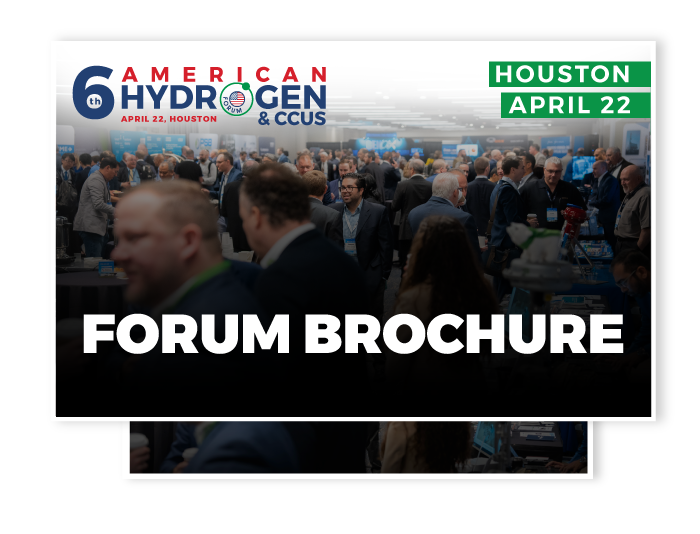
About the forum
6th American Hydrogen & CCUS Forum
April 22, 2026, Houston
ALJ Group is proud to present the American Hydrogen & CCUS Forum, taking place in Houston, Texas, in April 22, 2026 — a pivotal event bringing together two transformative forces in the energy transition: hydrogen and carbo
New for 2026: the forum will feature dedicated sessions on electrolyser manufacturing & supply-chain scale-up, hydrogen derivatives and SAF/eFuels, hydrogen export and seaborne ammonia markets, CO₂ markets and commercial utilisation pathways, and digital solutions for monitoring, optimisation and carbon accounting. Expect practical deep-dives on power sourcing (PPAs & renewables integration), onboard maritime CCUS and logistics, and bankable offtake structures — all tailored to accelerate real projects to FID.
The American Hydrogen & CCUS Forum will unite policymakers, energy executives, technology developers, investors, and researchers for high-level discussions, technical presentations, and cross-sector collaboration. Participants will gain critical insights into:
Hydrogen production, storage, transport, and end-use applications
The integration of CCUS in hydrogen production, industrial operations, and power generation
Policy and regulatory frameworks, including the latest on the 45V tax credit and federal funding programs such as DOE Hydrogen Hubs
Investment trends and project financing strategies enabling large-scale deployment
Houston — the energy capital of the world — provides the ideal backdrop for these essential conversations. The city’s strong industrial base, infrastructure, and innovation ecosystem make it a strategic hub for advancing hydrogen and CCUS technologies.
Join us in Houston for two days of strategic dialogue, networking, and collaboration to shape the future of low-carbon energy. Together, we can accelerate the development and commercialization of hydrogen and CCUS solutions that are vital to achieving global climate goals and ensuring a sustainable, economically viable energy transition.
Reasons to attend

1. Insightful Keynotes and Presentations
Gain firsthand knowledge from leading experts, policymakers, and industry pioneers who will share the latest advancements, trends, and innovations in the hydrogen sector.

2. Exclusive Networking Opportunities
Engage with top executives, decision-makers, and innovators. Build valuable connections and foster collaborations that can drive your business forward.

3. Cutting-Edge Technology Showcases
Explore the latest hydrogen technologies and solutions through interactive exhibits and demonstrations, providing a comprehensive understanding of current and future capabilities.

4. In-Depth Panel Discussions
Participate in thought-provoking panels that delve into critical topics such as hydrogen production, infrastructure development, policy frameworks, and the role of hydrogen in decarbonizing various sectors.

5. Strategic Business Meetings
Benefit from organized face-to-face meetings with selected participants, ensuring that you connect with the right people to advance your projects and initiatives.

6. Prestigious and Influential
Venue Houston, a leading hub for energy innovation, offers a dynamic backdrop for the forum. Experience a city renowned for its strategic importance in the hydrogen sector and its history of driving energy solutions.
Forum Agenda & Topics
The American Hydrogen & CCUS Forum features a dynamic agenda designed to explore the forefront of hydrogen innovation and its pivotal role in the energy transition. Attendees can expect insightful keynote sessions, in-depth panel discussions on policy and technology, interactive technology showcases, and exclusive networking opportunities. The agenda is meticulously crafted to provide attendees with valuable insights, foster collaborations, and drive forward sustainable energy solutions.
Would you like to be a speaker and be featured on it?

Topics
1
Scaling Low-Carbon Hydrogen Production
Next-Gen Electrolyser Supply Chains: Managing global sourcing, recycling, and domestic manufacturing under tighter cost and sustainability pressures.
Hydrogen Color Spectrum 2.0: Blue, green, turquoise, and emerging low-carbon pathways — updated economics, lifecycle carbon, and market positioning in a maturing hydrogen economy.
Policy & Incentive Outlook 2026: Navigating IRA updates, EU & U.S. subsidy evolution, and carbon credit schemes impacting hydrogen competitiveness.
Financing Large-Scale Projects: CAPEX, risk mitigation, and investment strategies under post-2025 market conditions.
2
CCUS & Carbon Management for Hydrogen
Scaling CO₂ Capture & Storage: Deploying reliable and cost-efficient CO₂ capture, transport, and storage infrastructure for hydrogen plants.
Advanced Source-Sink Integration: Matching CO₂ sources with storage/utilization, pipeline integrity, and long-term risk management.
Regulatory & Environmental Landscape: Navigating 2026 permitting updates, storage regulations, and community engagement in onshore CO₂ projects.
Commercializing Carbon Assets: Market-based revenue streams from CO₂ credits, utilization in fuels, chemicals, or EOR in a post-2025 CCUS market.
3
Hydrogen Infrastructure & Distribution
H₂ Hubs & Regional Networks: Designing scalable pipelines, liquefaction, and trucking solutions in an expanding U.S. hydrogen ecosystem.
Grid Integration & P2H Alignment: Coordinating renewable electricity, power-to-hydrogen, and balancing generation variability.
Logistics & Storage Optimization: Minimizing costs for compression, transport, and storage as demand grows.
Near-Term Offtake Planning: Industrial, transport, maritime, and mobility segments shaping the first large-scale hydrogen markets.
4
Market Dynamics, Investment & Commercialization
Global Hydrogen Outlook: Assessing demand, competitiveness vs. fossil fuels, and emerging low-carbon fuel markets.
Adapting to Market Shifts: Lessons from delayed or canceled projects and strategies to mitigate risk in a post-2025 investment landscape.
Flexible Offtake & Contracting: Innovative offtake agreements and market structures under evolving policy and price conditions.
Capital Mobilization: Public-private partnerships, foreign investment, and cross-sector collaboration driving hydrogen growth.
5
Innovation, Technology & Digital Tools
Next-Generation Electrolysers & Reactors: Efficiency, modular deployment, and cost reduction for scale-up beyond early commercial plants.
Digitalization & AI for H₂ & CCUS: Real-time monitoring, operational optimization, leak detection, and carbon analytics for integrated infrastructure.
Advances in CO₂ Capture & Utilization: Modular capture solutions and lower-cost storage supporting hydrogen and broader industrial decarbonization.
Emerging Hydrogen-Derived Fuels & Value Chains: E-fuels, ammonia, and industrial feedstocks for deep decarbonization sectors.
6
Policy, Regulation & ESG
Permitting & Compliance Evolution: Updated hydrogen production and CO₂ storage regulations, ESG requirements, and environmental safeguards.
ESG & Lifecycle Emissions Accounting: Integrating community impact, social license, and carbon tracking in hydrogen and CCUS projects.
Navigating Regulatory Uncertainty: Funding changes, tightened rules, and their effects on project viability and market design.
Long-Term Hydrogen Pathways: Strategic policies and roadmaps for hydrogen in transport, industry, and power decarbonization by 2030+.
Topics
1
Unlocking Hydrogen Economy Potential
- The benefits and concerns of developing the hydrogen economy:
Benefits: Hydrogen’s versatility in various sectors, from transportation to industry, and its potential to decarbonize the economy, reducing greenhouse gas emissions.
Concerns: Safety issues, high production costs, and the need for a comprehensive infrastructure overhaul to support hydrogen applications.
- US government’s role in developing the hydrogen market in the USA:
Policy Support: Incentives, grants, and regulations promoting hydrogen adoption.
Investment in R&D: Funding research to enhance hydrogen production, storage, and utilization technologies.
Infrastructure Development: Promoting hydrogen refueling stations and distribution networks.
- Creating a Safe Investment Environment and Ensuring Demand:
Certainty in Policy: Long-term government support to give investors confidence.
Public Awareness: Educating the public about hydrogen’s benefits to create demand.
Collaborative Partnerships: Industry-government cooperation to mitigate risks and spur investment.
2
DOE Hydrogen Hubs
- Introduction to DOE Hydrogen Hubs:
Providing an overview of the Department of Energy’s (DOE) initiative to establish hydrogen hubs.
Discussing the rationale behind the creation of these hubs and their role in advancing the hydrogen economy.
- Selected Locations:
Detailing the locations selected for the DOE hydrogen hubs.
Exploring the criteria and considerations that led to the selection of these specific regions.
- Hub Development Plans:
Outlining the plans and strategies for developing the hydrogen hubs.
Discussing the expected outcomes and contributions of each hub to the broader hydrogen ecosystem.
- Collaboration and Partnerships:
Exploring the collaborative efforts between the DOE and various stakeholders in implementing the hydrogen hubs.
Highlighting partnerships with industry, academia, and local communities to drive hydrogen innovation.
- Technological Focus Areas:
Identifying the technological focus areas within each hydrogen hub.
Discussing how these hubs aim to address challenges and promote advancements in specific hydrogen-related technologies.
- Economic and Environmental Impacts:
Assessing the anticipated economic and environmental impacts of the DOE hydrogen hubs.
Exploring how these hubs contribute to job creation, economic growth, and the reduction of carbon emissions.
- Future Outlook:
Discussing the long-term implications and potential scalability of the DOE hydrogen hubs.
Considering the broader influence on national and global hydrogen strategies.
3
Timing and Regulatory Framework for 45V
- Overview:
Exploring the eagerly anticipated 45V initiative and its significance in the hydrogen landscape.
Discussing the current state of anticipation and heightened interest surrounding the 45V initiative.
- Timing Considerations:
Examining the expected timeline for the implementation of 45V.
Analyzing the factors influencing the timing of 45V and potential implications for the hydrogen sector.
- Regulatory Landscape:
Investigating the regulatory framework associated with 45V.
Exploring how regulatory developments may impact the adoption and growth of hydrogen technologies.
- Stakeholder Perspectives:
Gathering insights from industry experts and stakeholders on their expectations and preparations for 45V.
Discussing how different sectors within the hydrogen industry are positioning themselves in anticipation of 45V.
4
Project Development in the USA
- Financing of hydrogen projects:
Public and Private Investment: Establishing innovative financing models, including public-private partnerships.
Project Finance Models: Safety issues, high production costs, and the need for a comprehensive infrastructure overhaul to support hydrogen applications.
Risk Mitigation Strategies: Addressing concerns about the uncertainty of government support by discussing risk mitigation strategies that can be adopted by private stakeholders
Private Sector Initiatives: Exploring the role of private companies and industries in driving hydrogen projects without relying heavily on government support
Alternative Funding Sources: Investigating alternative funding sources such as impact investors, foundations, and grants and the criteria for eligibility and the challenges associated with each funding source
Market-driven Approaches: Discussing how market forces and consumer demand can influence the growth of the hydrogen economy and the role of innovation and competition in driving down costs and making hydrogen technologies more economically viable
- Latest Developments – Currently Ongoing Projects and Future Plans:
Regional Initiatives: Highlighting state-specific projects and cross-state collaborations.
Scaling Up: Discussing how existing projects can be expanded and replicated.
Global Partnerships: Leveraging international cooperation for project development.
- Cost-Competitiveness and Better Possibilities for Hydrogen Production and Applications:
Economies of Scale: Addressing how larger production scales can lower hydrogen costs.
Technological Advances: Innovations like high-temperature electrolysis and advanced catalysts.
Diverse Applications: Identifying emerging sectors where hydrogen can offer a competitive edge.
5
Technologies and Solutions for Use of Hydrogen
- Electricity Production via Fuel Cells:
Grid Integration: Integrating hydrogen fuel cells into the electrical grid for stability and resilience.
Stationary Power Generation: Using fuel cells for distributed energy generation.
- Hydrogen Fuel Cell Design, Development, & Manufacturing:
Innovations in Materials: Exploring novel materials to enhance fuel cell efficiency and durability.
Scalability: Developing cost-effective manufacturing processes for fuel cells.
- Hydrogen Use in Vehicles - Solving the Refueling Challenge:
Infrastructure Expansion: Expanding hydrogen refueling networks and their integration into existing infrastructure.
Vehicle Range and Performance: Improving fuel cell vehicle range and efficiency.
- Emission Reductions Associated with Blue or Green H2 for Shipping Fuel:
Green Hydrogen in Maritime Industry: Examining the use of green hydrogen as a clean fuel for ships.
Blue Hydrogen for Maritime Decarbonization: Discussing the carbon capture and utilization potential in the shipping sector.
- Using Hydrogen to Decarbonize Residential and Commercial Heating Systems:
Hydrogen-Ready Appliances: Development of appliances that can run on hydrogen or hydrogen blends.
Policy and Standards: Establishing regulatory frameworks to promote hydrogen heating solutions.
Connect with
Industry Leaders at the 6th American Hydrogen & CCUS Forum

Discover opportunities to engage as a speaker, sponsor, partner, or attendee at the 6th American Hydrogen & CCUS Forum. For more information on participation, please reach out to our team at